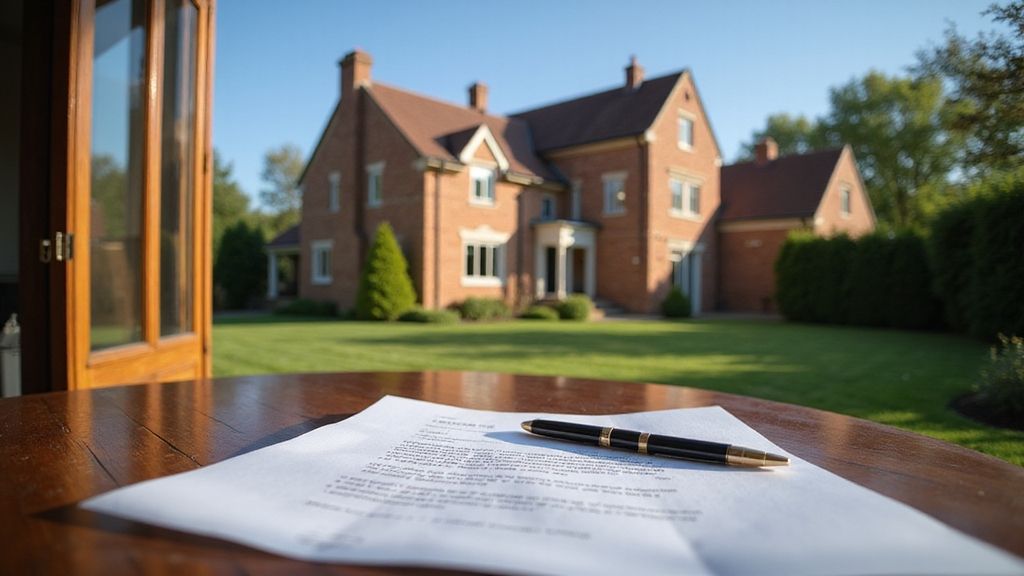Can a Judge Force You to Sell Your House in a Divorce?

Going through a divorce is challenging enough, but the thought of losing your home adds another layer of stress. Many couples find themselves stuck in heated battles over property division, especially when it comes to their shared house.
This situation often leads to sleepless nights and overwhelming anxiety about future living arrangements. Your home represents years of memories, financial investment, and stability for your family.
If you and your spouse disagree about what to do with the property, you might feel powerless and uncertain about your rights. The emotional and financial stakes make this decision particularly difficult.
Yes, a judge can force you to sell your house during divorce proceedings if it’s deemed necessary for equitable asset division.
However, understanding your legal rights and options can help protect your interests. This guide will walk you through the factors that influence court decisions about property division during divorce.
This comprehensive article explores your legal options and provides practical steps to protect your interests during property division.
Key Takeaways
- A judge has the authority to order the sale of a house if spouses cannot agree on its division.
- Court-mandated sales ensure fair asset distribution, especially when the house is considered joint property.
- Factors influencing such decisions include financial stability and child custody arrangements.
- If cooperation on sale terms fails, a judge can intervene to facilitate the process and maintain equity.
- Professional appraisers and real estate agents may be involved to assist in achieving a fair market sale.
What Happens to Your Home During a Divorce?

Your home’s status during divorce depends on state laws and court decisions. You and your spouse must decide what to do with the shared house.
If both parties cannot reach an agreement, the court will make the final choice. The house often falls under joint property in most divorce cases.
A judge may order the sale of your home to split assets fairly. You will need to pay off any mortgage or debts before sharing profits.
The court aims to protect both spouses from unfair financial burden. This process helps create a balanced split of all marriage assets.
When the court orders a sale, both parties must follow strict guidelines. So, the final decision ensures each spouse receives proper compensation.
If you keep the house, you might need to buy out your partner’s share. The laws focus on fair treatment of both parties during asset division.
Can a Judge Force the Sale of Your House?
A judge has the legal power to order you to sell your house during divorce proceedings. You and your spouse must reach an agreement about the property’s ownership. If both parties fail to decide, the court will step in with a binding decision.
The judge considers several factors before ordering a house sale. Your financial status plays a key role in the court’s final decision.
Child custody arrangements can affect whether the judge orders a property sale. The emotional value of your home matters, but practical issues often take priority.
If you cannot afford mortgage payments, the court may require selling the house. A third-party appraiser will determine the fair market value of your property.
So, the sale process ensures both parties receive their rightful share. When foreclosure threatens, selling might become the only practical solution.
The court’s decision helps prevent further financial troubles for both parties. You must follow the judge’s orders once the sale decision becomes final. This legal process protects the interests of everyone involved in the divorce.
When Is a House Likely to Be Sold in a Divorce?
A judge has legal power to order a home sale during divorce proceedings. You might lose control over keeping your house if mortgage payments become unmanageable. If both parties cannot agree on the property division, the court will step in. Since divorcing couples often struggle with home-related decisions, selling becomes necessary. This solution helps prevent future financial problems for both parties.
When spouses disagree about the property’s worth, courts typically order a sale. You can avoid forced sales through mutual agreements about property division. The court ensures fair distribution of assets through home sales. If one spouse cannot maintain the property alone, selling protects both parties’ interests. So, a house sale becomes inevitable when financial or emotional conflicts persist.
What Are Your Options to Keep the House?

You can explore several options to keep your house during a divorce. If you want to keep the property, you can buy out your ex-spouse’s share.
You will need to calculate the home’s equity and arrange payment terms with your former partner. This process requires refinancing the mortgage to remove your ex-spouse’s name from the loan.
We recommend getting a new loan that shows you can handle monthly payments alone. An interspousal transfer deed will legally transfer the property title to your name.
If you have children, you might qualify for a deferred home sale. This arrangement lets the parent with custody stay in the house for a set period.
Your children can maintain stability in their familiar environment through this option. You should consult a divorce attorney to understand these choices better.
How Is Home Equity Divided in a Divorce?
Home equity is typically split equally between spouses during a divorce according to state laws. You must first understand your options for keeping or selling the house.
A professional appraiser will determine the current market value of your property. This valuation helps courts make fair decisions about dividing the equity between both parties.
If you want to keep the house, you will need to buy out your spouse. The buyout process often requires refinancing the mortgage in your name only.
We recommend considering all financial aspects before making this decision. You can also choose to sell the house and split the profits.
This option might be simpler if neither spouse wants to keep the property. If you decide to sell, you should review tax implications carefully.
The tax laws offer specific exclusions for home sales during divorce. These decisions will affect your financial future, so careful planning is essential.
What If Neither Spouse Can Afford to Keep the House?
A court will order the sale of a house when divorcing spouses cannot afford it. You might need to sell the property if neither party can manage monthly mortgage payments.
This decision helps prevent foreclosure and ensures fair division of the property’s value. If both spouses face financial hardship, they should consider selling the house quickly.
The court will request a professional appraiser to determine the home’s current market value. While deferred sales could be an option, they rarely work for couples with money problems.
So, both parties must cooperate to sell the property and split the proceeds fairly. You can protect your interests by working with a real estate agent who specializes in divorce sales.
This solution allows both spouses to move forward and establish separate households. If mortgage payments become impossible, selling prevents damage to both credit scores.
Why Selling Your House for Cash Can Be a Solution
Cash house sales offer quick solutions for couples going through divorce proceedings. You can access immediate funds to handle urgent expenses and legal costs. When spouses separate, getting a new mortgage becomes difficult due to credit issues.
This method helps both parties avoid complex mortgage discussions and refinancing problems. If you choose a cash sale, the process moves faster than traditional home sales.
We understand that quick sales reduce the stress of property division between separating couples. So, both parties can start their new lives sooner without property complications.
Since cash buyers make direct purchases, you avoid dealing with bank approvals and delays. You and your ex-spouse can split the money right after the sale closes. While traditional sales take months, cash deals often close within weeks.
What Are the Benefits of an As-Is Cash Sale During Divorce?
An as-is cash sale during divorce helps both parties move quickly through property division. You can avoid the stress of lengthy court procedures and negotiations. This method eliminates the need for costly home repairs or improvements.
We see faster closing times with cash sales compared to traditional financing methods. If you choose this option, you will get immediate access to your home equity. This quick access to funds helps both parties start their new lives. The as-is sale prevents disagreements about home repairs or property value. You won’t need to worry about inspection issues or repair negotiations.
So, both parties can focus on moving forward with their lives. When you sell for cash, the process becomes much simpler and clearer. If market conditions are challenging, an as-is sale might bring a lower price. This straightforward approach reduces emotional strain during the divorce process. The simplified process helps prevent additional conflicts between divorcing spouses.
How Does the Home Selling Process Work in a Divorce?
The home selling process during divorce requires legal oversight when spouses cannot reach an agreement. If both parties disagree about the price, a professional appraiser must determine the fair value. You will need to work with a real estate agent to list and market the property.
The court provides guidance throughout the selling process to ensure fairness. When offers arrive, both parties must review and agree on accepting them. A judge can order the sale if one spouse refuses to cooperate.
The mortgage balance gets paid first from the sale proceeds. You and your spouse will split any remaining equity based on court orders. If financial problems arise, the court may speed up the selling process. This helps prevent issues like foreclosure or mounting debt. While the process seems complex, following court directions ensures a proper sale.
Need a Quick House Sale During Divorce? Contact Pezon Properties Today
A judge holds the authority to mandate a house sale during divorce proceedings. You and your spouse must either reach an agreement or follow the court’s decision. This process ensures fair distribution of assets between both parties.
We help homeowners facing divorce settlements with quick cash offers:
- We buy houses in Elizabethtown
- We buy houses in Emmaus
- We buy houses in Ephrata
- We buy houses in Exeter Township
- We buy houses in Fleetwood
We at Pezon Properties understand the challenges of divorce-related property sales. Our team offers immediate cash purchases without repairs or renovations. You can contact us today at (484) 484-0971 for a free, no-obligation cash offer. We promise a smooth, stress-free transaction during this difficult time.
Give us a call anytime at 484-484-0971 or fill out this quick form to get started today!
Get A Fair Cash Offer On Your House

About the author
Mathew Pezon
Mathew Pezon is the founder and CEO of Pezon Properties, a cash home buying company located in Lehigh Valley, Pennsylvania. With several years of experience in the real estate industry, Mathew has become a specialist in helping homeowners sell their properties quickly and efficiently. He takes pride in providing a hassle-free, transparent, and fair home buying experience to his clients. Mathew is also an active member of his local community and is passionate about giving back. Through his company, he has contributed to various charities and causes.















